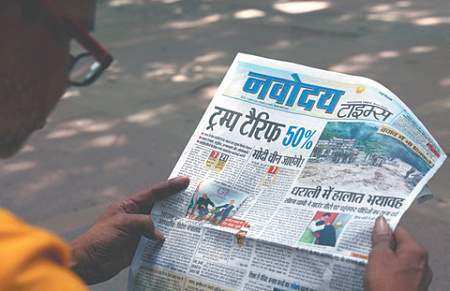
A high-stakes move by the White House to pressure India over its purchase of Russian oil is threatening to unravel a key strategic partnership and push New Delhi closer to Washington’s primary rivals, Russia and China. In an effort to cripple Moscow’s finances amid the ongoing conflict in Ukraine, the U.S. has threatened to impose crippling tariffs on Indian imports unless the nation ceases its energy trade with Russia, a move India has decried as unjust.
At the heart of the standoff is Washington’s apparent willingness to sacrifice decades of diplomatic progress with the world’s most populous democracy. The proposed 50% tariff would be a severe blow to a relationship that U.S. leaders have carefully cultivated as a cornerstone of their Indo-Pacific strategy. For years, the U.S. has viewed a strong, friendly India as a critical counterweight to China’s expanding influence, a strategy now at risk over the oil dispute.
India has firmly rejected the American ultimatum, arguing that its purchases of discounted Russian oil are essential for its rapidly growing economy. New Delhi officials point out that other countries, including China and even NATO member Turkey, continue to buy Russian energy without facing similar repercussions. The economic stakes for India are immense, as the proposed tariffs could halve its $86 billion in exports to the United States, its largest trading partner, and destabilize its domestic economy.
This escalating economic dispute is casting a dark shadow over vital security alliances. India is a central member of the Quadrilateral Security Dialogue (QUAD), alongside the U.S., Japan, and Australia—a grouping formed specifically to ensure a free and open Indo-Pacific. The current tensions jeopardize the unity of the alliance and place future high-level engagements, including a planned summit in India, in serious doubt.
In a clear signal of its shifting calculus, India is actively strengthening ties with the very powers the U.S. seeks to isolate. Prime Minister Narendra Modi is reportedly planning to attend the Shanghai Cooperation Organisation (SCO) summit in Beijing, a security bloc dominated by China and Russia. Such a visit would be a significant diplomatic overture, marking a deliberate effort to mend fences with China following a tense border standoff in 2020.
Simultaneously, New Delhi is deepening its economic cooperation with Moscow beyond the energy sector. Recent bilateral meetings have led to new agreements to increase collaboration in key industries such as aluminum, fertilizers, and railway transportation. Rather than isolating Russia, Washington’s pressure campaign appears to be solidifying the very partnership it intended to fracture, potentially reshaping the geopolitical landscape of Asia.
